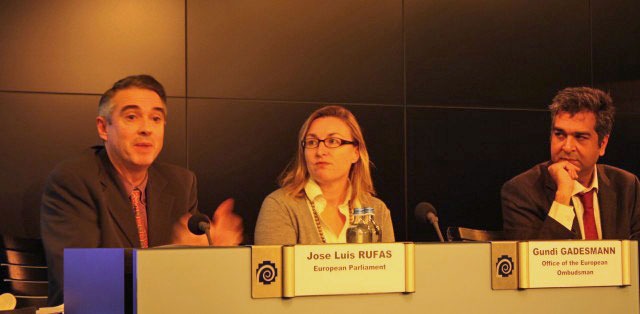Lobbying transparency, political ethics and the possibility for citizen participation in the European Union were the themes of a conference today organised by Friends of the Earth Europe together with organisations from five European countries.
‘Participation, Ethics and Transparency: What citizens want from Brussels’ was hosted in Brussels as part of the EU Citizens project. In two panel discussions, members of the European Parliament, the European Commission, and civil society, as well as European citizens, took part in lively debate, with many interesting and challenging questions coming from the audience.
In the first panel the animated debate revolved around questions of second jobs for members of the European Parliament, their duty to disclose their financial interests and potential improvements in the Parliament’s ethics regulation. Friends of the Earth Europe’s Paul de Clerk and Isabelle Durant, European Green MEP and vice president of the European Parliament, advocated much tighter regulation for Members of the European Parliament to avoid conflicts of interest. Rainer Wieland, European People’s Party MEP and also a vice president of the European Parliament, criticised this approach as feeding a culture of mistrust. Tim King, editor of the European Voice, called on the MEPs to not only follow the letter, but the spirit of the European Parliament’s ethics regulations. Audience members posed questions to the panellists about citizens’ role in participating in European political processes.
The second panel focussed on the transparency of decision-making in Brussels and the way lobbying is regulated. Christian Linder from the European Commission defended the current voluntary lobbying register as a success, while Peter Facey of the transparency campaign group Unlock Democracy pointed to the necessity of a mandatory, strictly controlled lobbying register. Jose Luis Rufus from the European Parliament’s Transparency Register Secretariat stressed the progress that has been made in transparency issues over the last years and Gundi Gadesmann from the Office of the EU Ombudsman encouraged citizens to use the services of the Ombudsman if they want to file a complaint about an EU institution. Many of the questions in the discussion were asked by members of the audience, which highlighted the interest of Europe’s people in transparency issues.
Throughout the conference, a Twitter feed was projected beside the panellists, and gave citizens the opportunity to comment on the discussion and spread the conference’s messages online.
Friends of the Earth Europe continues to advocate for stricter transparency rules for European Union institutions. A recent publication highlights the shortcoming of the financial interest declarations of Members of the European Parliament. Other areas Friends of the Earth Europe is working on include cases of conflicts of interest among politicians and civil servants, the privileged access large corporations enjoy to policy-makers in the European Union institutions and the lack of transparency of lobbying practices in Brussels. The EU Citizens project is a partnership between organisations specialising in health, environment and the regulation of lobbying, with the central aim to increase the transparency of the EU and to allow for greater and more meaningful public participation in EU decision-making.







